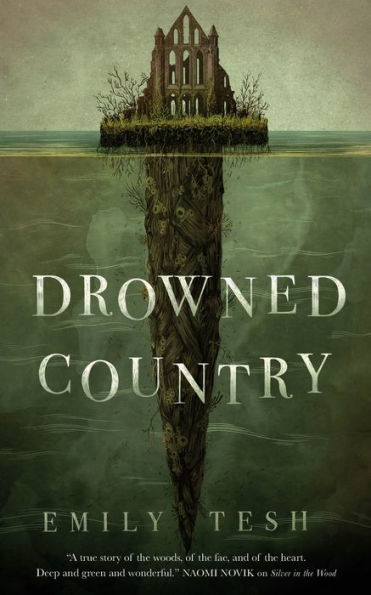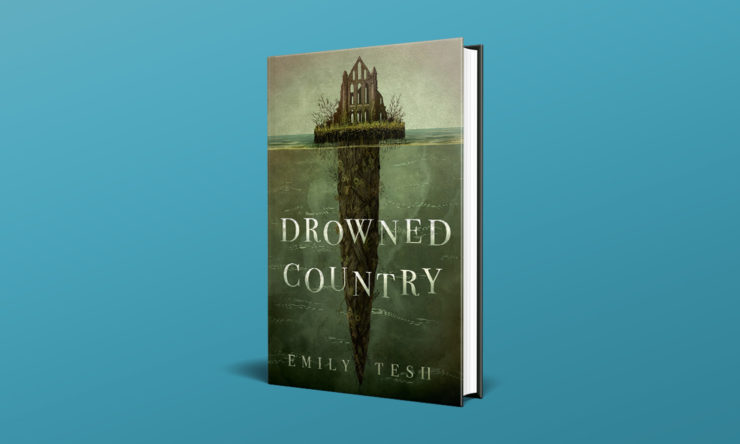[Some spoilers for book one, Silver in the Wood]
A little over two years have passed since the end of Silver in the Wood, the first book in Emily Tesh’s Greenhollow duology. Although that book ended on a hopeful note—with Henry Silver coming into his newly acquired powers and Tobias Finch finally learning to love again—the sequel begins with despair. Silver lives alone in Greenhollow Hall while his former lover has left him to fight monsters with Silver’s mother Adela. As Silver mourns and wallows, Tobias flourishes with independence and productivity.
Right in the middle of a powerful sulk, Silver’s mother arrives with a task. Adela suspects Maud Lindhurst of Rothport, a harbor town shrouded in fog and lined with “crooked houses” and “foul-smelling sand,” is the victim of a local vampire. She and Tobias need someone in his magical weight class, so to speak, because the bloodsucker is more than they can comfortably manage on their own. Silver agrees, partly because he can’t refuse his mother and partly because he’s desperate to see Finch again. Below the ruins of the old abbey where the vampire nested lie the bones of what once was the farthest edge of Silver’s Hallow Wood. What Henry and Tobias find there is not what they expect, and leads to a world that might never let them go.
Where Silver in the Wood let Tobias frame the story even as the bulk of the plot happened to Silver, Drowned Country is Silver’s perspective on what newcomer Maud Lindhurst undergoes. Silver’s trials, like Tobias’ in the first book, are largely emotional ones. The fling between him and the former Wild Man did not last, mostly because Silver screwed it up. Silver may be a god-like entity now, but emotionally and mentally he’s still so very human. The relationship mistakes he makes as the magical Lord of Greenhollow Hall are likely the same ones he would have made if he had never stopped being human. Love doesn’t fix personal damage or unpack psychological baggage. If anything, it exacerbates them. Ignore them at your peril—a lesson Silver learns the hard way.
Buy the Book


Drowned Country
Though Silver is the star, Maud Lindhurst bears the brunt of the action. She is exactly the kind of woman who rarely got written about in Victorian and Edwardian literature, and when she did it was never in a positive light. Maud is what I always wished Mina Harker had been allowed to be. She’s bold and reckless, not unlike Henry Silver. But while others find Henry’s insouciance charming, Maud is shamed for it. Emily Tesh plays with that contradiction but refrains from giving that shame any validity. Henry may use her as an excuse to hover around Tobias and as a way to exorcise his own demons, but she’s very much her own woman. Despite her parents’ stifling rules, Maud will not be cowed or led. She wants freedom and will do anything and everything—including taking on an ancient vampire and marching into a wild Fairyland—to get it.
Tesh is one of those writers who it’s hard not to love. She writes like she’s planting a garden. Her stories grow slowly then bloom all at once. You go from standing with your bare feet feeling the rich soil to being surrounded by an explosion of flowers and creeping vines. Reading the Greenhollow duology is not unlike reading an old English folktale, as if you found a tattered century-old volume in the back of a used bookstore and sat down on the floor to peruse it. The series feels told rather than read.
And when Tesh combines her lush writing style with an impeccable eye for exploring emotional wreckage, the result is the kind of story you can’t help but feel. I wanted to reach through the page and pat Tobias on the cheek or give Silver a withering stare. Mostly the latter.
There was a healthy crab apple demolishing its way through the ceiling and floor of what had once been a whitewashed ground-floor bedroom in the east wing. Crooked branches laden with white blossom and sour fruit together thrust from broken windowpanes. The tree had been in both blossom and fruit for months and it was not happy. Silver was not happy either. Sometimes he went and sat in there and felt sorry for himself.
Other places Silver felt sorry for himself: his study, which as all the servants had left months ago was a mess; his library, which was hardly better; his bedroom, where mistletoe hung from the bedposts like midwinter baubles; and of course the floor of the great hall, where the cold of the ancient stones seeped into his back and the moss was spreading lusciously along the cracks between them.
I consumed Drowned County in an afternoon, but I wish I had slowed down and savored it more. I loved spending time with Henry Silver and Tobias Finch. The Greenhollow duology will be one of those series I reread over and over again. Wherever Emily Tesh writes after this, she has a fan for life.
Drowned Country is available from Tordotcom Publishing.
Read an excerpt here.
Alex Brown is a teen services librarian by day, local historian by night, author and writer by passion, and an ace/aro Black woman all the time. Keep up with her on Twitter and Insta, or follow along with her reading adventures on her blog.










